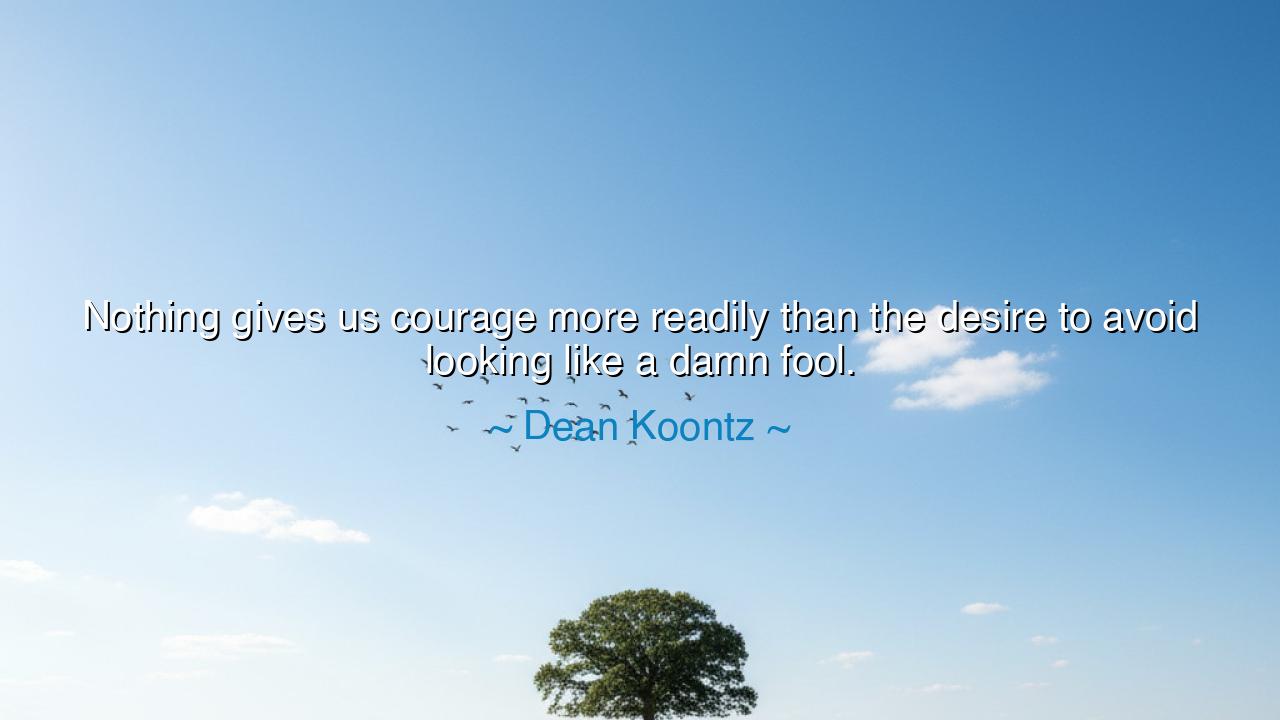
Nothing gives us courage more readily than the desire to avoid
Nothing gives us courage more readily than the desire to avoid looking like a damn fool.






“Nothing gives us courage more readily than the desire to avoid looking like a damn fool.” — Thus spoke Dean Koontz, the modern storyteller who saw with piercing clarity the hidden motives that drive the human heart. Behind his wry humor lies a truth as old as humanity itself: that pride, though often counted among the lesser virtues, can sometimes be the spark that lights the fire of courage. For men and women have leapt into battle, faced impossible odds, and performed wonders — not out of pure nobility, but out of the simple, stubborn refusal to appear foolish before the eyes of others. The desire to preserve dignity, even in fear, can summon valor where none seemed to exist.
Do not mistake this for mockery of courage — no, it is its strange companion, its shadow-born twin. The ancients knew that human virtue is often born from imperfection. A man’s wish to preserve his honor, or even his appearance of strength, can draw from him a bravery that surprises even himself. The fear of humiliation — that primal sting to pride — becomes, in certain hearts, a sacred motivator. It is not the purest form of courage, but it is real nonetheless, and through it, one may discover a deeper truth: that courage does not always descend from heaven like lightning; sometimes, it rises from the mud of our own humanity.
History offers countless proofs of this. Think of the Spartans at Thermopylae — three hundred warriors standing against an empire. They knew death awaited them, yet they did not flee. What held them there? Yes, devotion to their homeland and their king — but also, undeniably, the iron will not to appear cowardly before one another. To turn and run would have been to brand themselves forever with shame. And so, even as their hearts trembled, they stood firm. Their pride became their salvation, and in refusing to look like fools before history, they wrote their names upon eternity. Thus we see that even flawed motives can give birth to immortal deeds.
But Koontz’s words also reveal something more intimate — the daily courage of ordinary souls. How many of us have stepped forward, trembling, only because retreat would have felt more humiliating? How many soldiers have charged because their comrades were watching, or artists have finished their work because they dared not fail in front of critics? Even the child who stands before a class to speak, voice shaking, does so because pride whispers, “Do not falter now.” It is this whisper — half fear, half strength — that pushes the timid into triumph. The desire not to appear foolish is the cloak behind which courage often hides until it learns its own name.
And yet, within this irony lies a deeper beauty. For when one acts bravely to preserve appearances, the act itself transforms the soul. The outer show becomes inner truth. By pretending to be brave, one becomes brave. The old warriors said, “Act as if you were fearless, and fear will die.” Thus, what begins as the avoidance of shame becomes genuine fortitude. The mask becomes the face. It is one of life’s great paradoxes: even our lesser motives can be the tools through which we are made greater.
The origin of Koontz’s quote lies in his understanding of human nature as both flawed and magnificent. His characters are often ordinary people thrust into extraordinary danger, forced to act not because they are fearless, but because they are human — proud, frightened, and unwilling to be seen as weak. This insight reflects the wisdom of the ancients: that courage is not always divine inspiration, but often a struggle within the heart between pride and fear. The wise do not despise such courage, for it is through these small, reluctant acts that humanity grows strong.
So, my listener of the present and the future, take this lesson to heart: Do not wait for perfect courage. You may never find it. If pride, or shame, or the fear of looking foolish is what pushes you to act, then act — for through that action, true courage will awaken. The body moves before the soul believes, and in that motion, transformation begins. Better to stumble forward in pride than to sit safely in fear. Better to risk foolishness than to be enslaved by hesitation.
For in the end, courage, however it is born, ennobles the one who dares. What begins as the defense of one’s image may end as the liberation of one’s spirit. So when the moment comes and fear seizes your throat, remember this truth of Koontz: that even the most human of motives — the wish not to appear foolish — can summon the divine strength that lies hidden within you. Step forward, then, even trembling. You may look the fool for a moment — but for eternity, you will stand among the brave.






AAdministratorAdministrator
Welcome, honored guests. Please leave a comment, we will respond soon